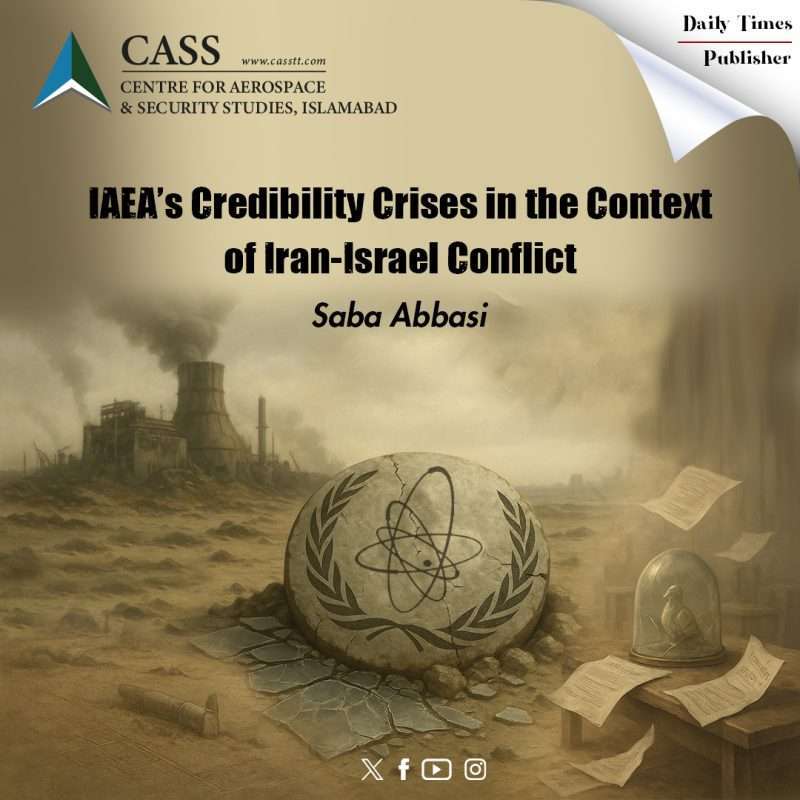The 12-day Israel-Iran conflict was believed by many to be the beginning of World War III. Israel’s killing of the top military commanders and nuclear scientists and the destruction of military and nuclear sites were met with counteroffensives by Iran. The confrontation between the two countries posed a highly precarious situation that threatened to engulf the entire region. On 22 June 2025, the US bunker-buster strikes on three Iranian nuclear sites further intensified the ominous anticipation of a bigger war that could have entangled state and non-state allies of Iran and Israel.
After the ceasefire between two states, one of the first steps that Iran took was to ban Director General of International Atomic Energy Agency (IAEA) Rafael Grossi from entering its territory and refusing IAEA’s surveillance at its nuclear sites. In this regard, Iran’s steps to suspend cooperation with the agency were not unforeseen, as the echo of IAEA’s role in enabling this war had been circulating for some time.
IAEA is the United Nation’s nuclear watchdog that oversees the peaceful and responsible use of nuclear energy to uphold the nuclear non-proliferation regime. IAEA’s interdependent relationship with the Nuclear Non-Proliferation Treaty (NPT) mandates it to monitor signatory states’ compliance with the treaty’s standards. However, agency’s credibility is grounded in its neutrality and in sustaining states’ trust. Iran’s accusation that the IAEA’s Director General is biased and complicit in the recent conflict brings into question agency’s normative traits of impartiality and reliability.
As per one of Iran’s accusations, IAEA’s politically biased reporting served as a pretext for Israel’s attack. On 12 June 2025, the agency’s board of governors passed a resolution that declared Iran non-compliant with NPT’s obligations, followed by Israel’s attack on Iran on the night of 13 June 2025. The IAEA board meeting was timed for the final day of President Trump’s 60-day ultimatum to Iran to negotiate a new nuclear agreement. Iran claims that IAEA assisted Israel in setting the stage for war by passing the resolution. Moreover, the issuance of a demarche by the USA to eight countries on the resolution’s board of governors, urging them to vote against Iran or abstain, further politicises the matter.
Iran’s formal complaint against the agency’s Director General at the UNSC stated that his public statements were glaringly partial. Rafael Grossi’s singular focus on Iran’s presumed violations and failure to publicly criticise Israel’s attack on Iran indicated a double standard. It suggested that an undeclared nuclear state, in violation of nuclear non-proliferation, is supposedly supported by the sentinel of the non-proliferation treaty.
During the war, Grossi appeared on Al Jazeera, where his inconsistent statements cast further doubts on the validity of IAEA’s previous report on Iran’s nuclear activities. He stated that the agency has no evidence that Iran is building a nuclear weapon, backtracking from his earlier claims of Iran enriching Uranium for military purposes. He also denied Tehran’s allegations of coordination with Israeli officials and the accusation that the scientists targeted by Israel were initially identified by IAEA’s report. However, he referred to Israel’s intelligence sharing with the agency about Iran’s undeclared nuclear sites. Such contrasting statements, in the background of Mossad’s 2018 intelligence report that led to IAEA reopening its investigation into the Iranian nuclear program, continue to undermine its credibility.
It is pertinent to mention that in 2008, the intelligence agencies of Israel and the USA gave documents to the IAEA that allegedly revealed that Iran was conducting research on four different types of nuclear weapons. Muhammad Al Baradei, then Director General of the IAEA, could not establish the authenticity of the documents and, therefore, refused to act on them despite the political pressures. Later, he wrote in this book that the USA and Israel “wanted to create the impression that Iran presented an imminent threat, perhaps preparing the grounds for the use of force.” If the current Director General of the IAEA had acted with the same impartiality, foresightedness, and caution, it is quite possible that the USA and Israel would not have marched to war with Iran.
Al Baradei also posted a tweet during the Israel-Iran war in which he stated that relying on force instead of negotiations is a sure way to destroy the nuclear non-proliferation regime. The use of force against a state’s sovereignty sends a message to many countries that their ‘ultimate security’ is to develop nuclear weapons. The impacts of the IAEA’s credibility erosion could be grave; states can lose trust in the integrity and objectivity of international organisations that are meant to facilitate cooperation and resolve crises. To regain institutional credibility, it is imperative for the agency to undertake internal oversight mechanisms and depoliticise its top leadership, so that the UN’s nuclear monitoring frameworks do not become a weaponised oversight for the compliant states.
Saba Abbasi is a Research Assistant at the Centre for Aerospace & Security Studies (CASS), Islamabad, Pakistan. The article was first published in Daily Times. She can be reached at [email protected]





